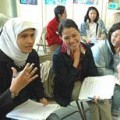Students from every corner of the world flock to American universities. They may be at ease with the most complex mathematical theories, but are often bewildered by Americans. So the University of California at Berkeley initiated a class for foreign students, who make up 60 percent of all post-doctorates on campus. Called America 101, it's a basic introductory course explaining everyday life in the United States. The International students in America 101 class are perplexed. A German student asks what it meant when an American friend invited him to dinner, saying, 'Let's go pig out on Buffalo wings. 'Others want to know when to use a handshake, a hug or a kiss on the cheek. "Culture shock means you come to a new country and everything is different." English Study Institute Director Bonu Ghosh teaches this 10-week course intended to ease foreign students' feelings of isolation and alienation. She explains that if culture shock gets the best of them, the result is an emotional roller coaster. "Everybody know what's a roller coaster?" she asks. The students answer with silence. Ghosh can't tell if they've understood her or not. But she forges on.
"Is it a bad thing, is it impolite to say no?" She answers her own question, "No! It's absolutely necessary. So if I say, 'would you like to have lunch with me today?' and you say, 'mmmm?' what are you really saying? No. In an indirect way. In this culture, American English, it is very important to say no." Students worldwide, from Israel to Kuwait to Uganda, agree that Americans' comfort with a cool 'no' is typical of our abrupt and direct style. But such directness makes many uncomfortable. Safa Gasser is an electrical engineer from Egypt. She admits, "Sometimes I just get shocked when the answer is like, strict and, 'no.' This is typically American, you know? They don't get embarrassed." America 101 course topics include restaurant protocol, telephone styles, and the how-to of a firm handshake. Instructor Ghosh says cultural training is as crucial as the students' academic training. Today, she focuses on the American job interview. A student from Japan would be modest, she says, "It would be bragging and it would be completely unacceptable to sell yourself. So they say, 'ah, I try hard.' And to an American interviewer this is completely inadequate." "Or a Brazilian student might open the interview with, 'Come to my house.' And this doesn't mean you're invited to come to their house. It just simply means I'm communicating with you. It's kind of like saying, 'how's it going?'" She suggests a Chinese student might focus entirely on how serious he is about his work, while another candidate might come across as easier to work with because he's casual, friendly and humorous. But before getting to the job interview, the foreign students have to deal with Americans on campus and in the community. And for many, that is the most significant dilemma: who are the Americans? Egyptian Safa Gasser says so much of the U.S. population -- filled with Asians, Latinos, blacks, Middle-Easterners -- looks foreign to her. "I don't know... The figures of Americans to me are the white, blond people that I see on TV. Then, where are the Americans? I can't find a lot of Americans!" For Gasser, the confusion is that the America she's trying to learn about is as diverse and multi-cultured as the students in America 101.

